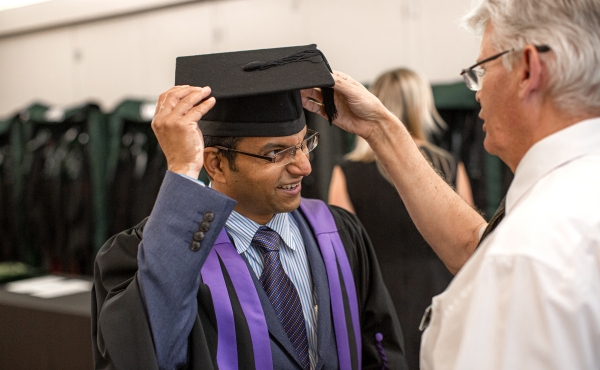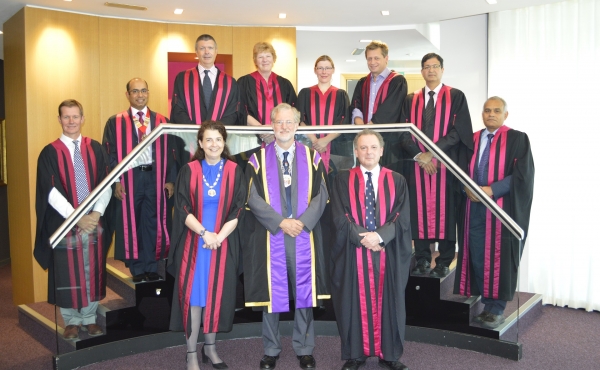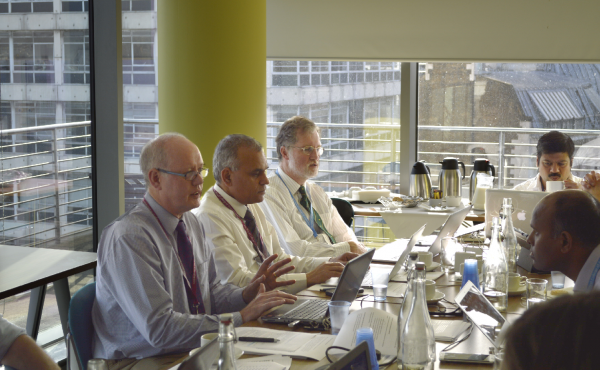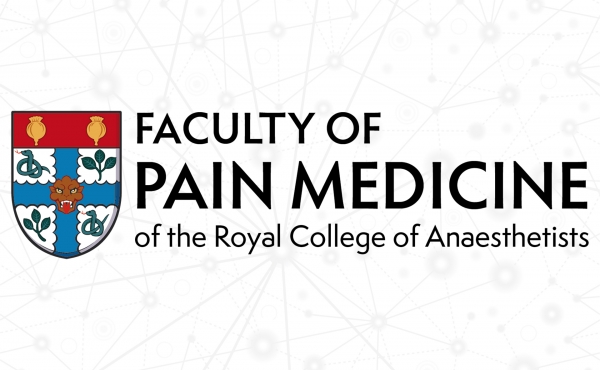About the Faculty
Who are we?
The Faculty of Pain Medicine is the professional body responsible for the training, assessment, practice and continuing professional development of specialist medical practitioners in the management of pain in the UK.
Dean's Statement
Dr Lorraine de Gray
The Faculty of Pain Medicine of the Royal College of Anaesthetists was established on 2 April 2007. The Faculty of Pain Medicine is the professional body responsible for the training, assessment, practice and continuing professional development of specialist medical practitioners in the management of pain in the UK. The FPM supports a multi-disciplinary approach to pain management informed by evidence-based practice and research.
Faculty structure
The Faculty functions through its secretariat and the work of its Board and two main committees; the Professional Standards Committee (FPMPSC) and the Training & Assessment Committee (FPMTAC). In addition, short term working groups are appointed to look at specific issues. These currently include the Medicines Advisory Group, The Pragmatic Pain Group and the Careers Subcommittee. Through our guidance and Pain Medicine training we promote the highest standards of practice for patients. We also serve our Fellows, Members and aspiring Fellows. Fellows and Members are from a range of backgrounds, from established consultants to newer consultants, as well as Specialty Grade Doctors working in Pain Medicine, trainees and educators. Each individual has their own needs, aspirations, and demands; it is our duty to address these. FPM Thrive is the Faculty of Pain Medicine's career mentoring and personal development programme for all doctors with a career in Pain Medicine in the UK. The aim of FPM Thrive is to facilitate a strong productive mentoring relationship based on mutual, equal and collaborative development and learning between mentors and mentees.
Training in Pain Medicine
Training in Pain Medicine is embedded in the 2021 Curriculum for a CCT in Anaesthetics . It comprises of Stage 1, Stage 2 and Stage 3A training, modules at each level now being compulsory for all anaesthetic trainees. Furthermore, specialist training in Pain medicine for Acute Pain is offered as an optional six-month module in Stage3 – specialist interest area as is specialist training in Acute and Chronic pain medicine as an optional one-year module. The Fellowship examination of the Faculty was introduced in 2012 to make explicit the high standards achieved by the trainees and to offer a respected and established currency in Pain Medicine. A court of examiners is headed by a Chair, and supported by the Royal College of Anaesthetists Examination Department.
Credentialing in Pain Medicine
In 2015 the GMC introduced the concept of Credentialing defined as “A new process to formally recognise a doctor's expertise in a specific area of practice ”. The Faculty of Pain Medicine applied to the General Medical Council to be one of the five pilot Credentials in 2018 and was accepted in 2019. Over the past four years, there has been significant progress with the curriculum first being endorsed by the GMC Curriculum Oversight Group (COG) in 2020 and subsequently reviewed and endorsed by the GMC Curriculum Advisory Group (CAG). The FPM is currently working with the GMC on the framework of implementation of Credentials.
Credentialing for the Pain Medicine Specialist is another milestone for the faculty. For the first time it will open the road to training in Pain Medicine to non-anaesthetic specialties. It will provide depth and stability to the workforce of doctors who work as Pain Medicine Specialists within the UK whilst raising standards in the practice of Pain medicine. Credential Holders will be listed as Pain medicine specialists in the GMC List of Registered Practioners. This importantly improves patient safety as it allows recognition of specialist training in Pain Medicine by patients and employers.
Trainers
Training in Pain Medicine at all levels is closely supervised by FPMTAC and appointed Regional Advisors in Pain Medicine and Faculty Tutors in Pain Medicine, who are in turn supported by FPMTAC and the Board.
Continued Professional Development
We also aspire to satisfy established consultant and non-consultant doctors’ educational needs through our very active meeting programme and in this way to facilitate their Continuing Professional Development. Support for revalidation is offered by the RCoA Revalidation Committee which has specialist Pain Medicine input for advice particular to Pain Medicine.
The effective and timely management of pain is a core skill for all doctors in any branch of medicine. We provide online teaching in the form of e-PAIN hosted on the NHS e-learning website and co-produced with the British Pain Society. This provides a very valuable source of teaching for doctors and all allied health professionals involved in caring for patients who suffer pain. The FPM Learning hub also provides another source of learning for all doctors training and/or working in Specialist Pain Medicine. Through Essential Pain Medicine (EPM) we are working with medical schools and post graduate deans to embed focussed teaching of Pain Medicine to medical students and foundation year doctors. This will aid in treatment; improving the patients' experience of diverse conditions, and raising awareness of the sometimes-complex nature of good pain management.
The Board has developed efficient working partnerships and alliances on behalf of our Fellows and Members, to include very close relationships with the RCoA and the British Pain Society (BPS) and joint working with the Chronic Pain Policy Coalition (CPPC), providing good patient links. We continue to work with the Clinical Reference Group for Specialised Pain Services who are developing specifications and policies for the NHS Commissioning Board.
Professional Standards
The second edition of the Core Standards for Pain Management Services (CSPMS ) was published in 2021. It is a collaborative multidisciplinary publication providing a robust reference source for the planning and delivery of Pain Management Services in the United Kingdom. It is designed to provide a framework for standard setting in the provision of Pain Management Services for Healthcare professionals, commissioners and other stakeholders to optimise the care of our patients.
Four Nation Pain Strategy
The Faculty, along with a range of patient and professional organisations, has developed a Four Nation Strategy for Pain Management. Published in 2022, this document provides a framework where pain management integrates across other stakeholder sectors of health and social care. It can be used to coordinate, deliver and further develop care using the resources and pathways already available while supporting future quality service developments. The Four Nation Strategy has been endorsed by multiple organisations including those representing patients.
Working partnerships
Over the past decade, the FPM has developed efficient working partnerships and alliances on behalf of our Fellows and Members, to include very close relationships with the RCoA, the British Pain Society (BPS) and the Royal College of General Practitioners. We work collaboratively with organisations such as the Personalised Care Institute, GIRFT, Versus Arthritis, Arthritis and Musculoskeletal Alliance as well as the Pain Parliamentary Campaign Group.
The Faculty takes part in regular consultations with all major stakeholders in Pain Medicine, including the Department of Health, the General Medical Council and the National Institute for Health and Care Excellence. We view this as a key opportunity to influence strategy and enhance and protect Pain Medicine as a specialist area in the UK.
The FPM also has lay person representation on its board and works collaboratively with patient pain groups such as Pain Concern, Action on Pain, Burning Nights and The Patient Voice of the British Pain Society amongst others.
Equality and Diversity
The FPM is committed to respecting and promoting Equality and Diversity. We are a progressive and inclusive Faculty and aspire to work hard to protect, nurture and celebrate that diversity, and to ensure equality of opportunity for everyone in our community. For our 10th anniversary, we compiled a list of all our key activities undertaken between 2007-2017. You can view these below.
A guide to Faculty activities 2007-2017
We date our anniversary from the first meeting of the ‘Initial Board’ of the Faculty, held in May 2007, which saw the election of the first Dean, Doug Justins, and its first Vice Dean, Karen Simpson. Before this, the embryonic ‘Founding Board’ was commissioned by the Royal College of Anaesthetists to oversee the transition of the College’s Pain Management Committee and its responsibilities into the Faculty we all know today.
The first 18 months saw the Faculty open Foundation Fellowship and develop its early work streams. Our story next picks up in 2009. This year by year digest is not intended to be exhaustive as there’s far too much to cover. It also can never truly detail the on-going work responding back to consultations, sending representatives to key initiatives, engaging with our partner organisations and national bodies, managing the media, and helping our fellows, members and trainees with their requests and concerns, or the work of our dedicated team of staff at Churchill House who make sure it all happens, on time. As is often the case, it is the little interventions and smaller queries that can weigh up over time to be as important as the big changes.
As the work of the Faculty grows, two standing committees of the Faculty, The Training & Assessment Committee (FPMTAC) and the Professional Standards Committee (FPMPSC), meet for the first time. An embryonic version of the FPM webpage is launched. Dave Rowbotham becomes the second Vice Dean. Our membership routes expand.
The Faculty’s newsletter, Transmitter, launches. Our first Education Meetings Advisor is appointed and oversees an overhaul of the Pain Medicine events programme. Much work is taken forward by FPMTAC, including creating the first trainee logbook. Guidance on specialist area competencies are produced. After three years and helping to birth the Faculty, Doug Justins stands down as Dean. Dave Rowbotham stands unopposed to succeed him.
In other news, a volcanic eruption in Iceland grounds air traffic across Europe and an amateur metal detectorist finds the UK largest haul of Anglo-Saxon jewellery in a field in Staffordshire.
During Dave’s first year, the FFPMRCA Court of Examiners is formed and begins the difficult tasks of populating a question bank and ensuring a fair and responsive standard setting process for the exam. The first guideline is produced by the FPMPSC with many more to follow in coming years. Kate Grady becomes the third Vice Dean.
Following the 2011 Pain Summit, for which FPM is a co-sponsor, we lead the development of ASK2QUESTIONS, a proposed primary care screening tool for pain. The Good Pain Medicine Specialist, guidance for revalidation, and What is a Pain Medicine Specialist?, a document on pain medicine specialists for the general public, are published. In this year we got approval from RCoA Council to pursue subspecialty status with the GMC, but Shape of Training put those plans on hold.
In other news, a tsunami causes a meltdown at the Fukushima Nuclear Power Plant and Team GB secures 65 medals at the Summer Olympic Games.
Dave ends his tenure as Deanship, bring Kate Grady into that august position. Mark Taylor becomes Vice Dean. The Faculty, with the BPS, achieves funding for e-PAIN, an e-learning resource for pain management, and begins the process of bring editors, authors and content online. The website is fully redeveloped, adding much additional content. 2013 also sees the launch of the first ever workforce census for Pain Medicine. A working party of the Training & Assessment Committee reviews and improves the assessment system for training, including retraining guidance and a new case report marking structure.
The first e-PAIN sessions go live. Careers content arrives on the website along with the first phase of patient leaflets and a detailed evidence base for Pain Medicine. The FPM develops the educational structure for Pain in Secure Environments and launches the trainee survey to aid a quality system for pain training. A guide to Pain Medicine training is produced. The FPM is also instrumental in setting up the cross-agency Pain Consortium.
In other news, tributes poured in from across the globe remembering the life of Nelson Mandela and Ebola rears its ugly head again.
The Hospital Review Form (for remote quality management of training) is rolled out. The FPM becomes the home for the Essential Pain Management (EPM) initiative with courses held across Africa. This also leads to start of the EPM Lite project, which aims to introduce pain management education into medical schools. Core Standards for Pain Management Services, the first multiprofessional standards of its kind are launched at a parliamentary reception alongside Opioids Aware, an essential prescribing resource. The Right Patient Right Professionals Right Time initiative begins a fresh involvement with key national figures. The Trainee Newsletter is launched.
Barry Miller becomes Dean. The first Acute Pain Census is completed and analysis begins. The first forum for Paediatric Pain Specialists is held and the Faculty website undergoes a restructuring. An Innovations and Reflections section of the website is added to help aid quality enhancement. Further patient leaflets (this time on interventions) are written ready for e-publishing in early 2017. The FPM joints the Twittersphere.
In other news, Storm Barney brought winds of up to 85mph to parts of the UK and many greats of music from Prince to David Bowie shuffle off this mortal coil to join that great gig in the sky.
The Faculty continues to undertake new work streams to promote Pain Medicine and improve services for people with pain. Please visit the rest of the website for more information on recent activities.
Are you interested in joining the Faculty?
Find out more about our routes of entry to membership.






